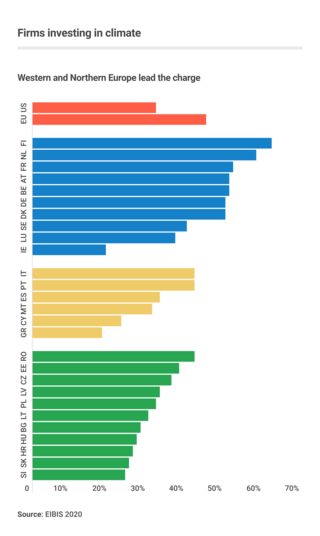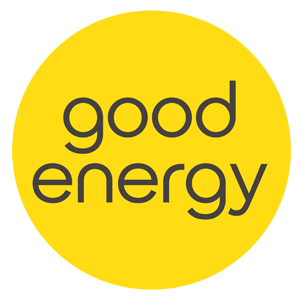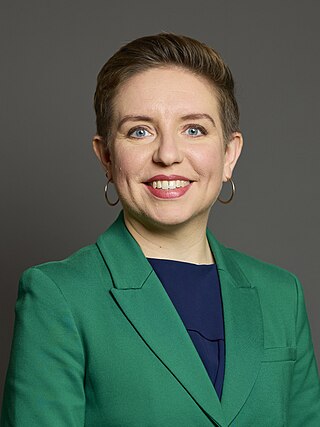Related Research Articles
A green economy is an economy that aims at reducing environmental risks and ecological scarcities, and that aims for sustainable development without degrading the environment. It is closely related with ecological economics, but has a more politically applied focus. The 2011 UNEP Green Economy Report argues "that to be green, an economy must not only be efficient, but also fair. Fairness implies recognizing global and country level equity dimensions, particularly in assuring a Just Transition to an economy that is low-carbon, resource efficient, and socially inclusive."
A sustainable business, or a green business, is an enterprise which has a minimal negative impact or potentially a positive effect on the global or local environment, community, society, or economy—a business that attempts to meet the triple bottom line. They cluster under different groupings and the whole is sometimes referred to as "green capitalism". Often, sustainable businesses have progressive environmental and human rights policies. In general, a business is described as green if it matches the following four criteria:
- It incorporates principles of sustainability into each of its business decisions.
- It supplies environmentally friendly products or services that replace demand for nongreen products and/or services.
- It is greener than traditional competition.
- It has made an enduring commitment to environmental principles in its business operations.

Business action on climate change is a topic which since 2000 includes a range of activities relating to climate change, and to influencing political decisions on climate change-related regulation, such as the Kyoto Protocol. Major multinationals have played and to some extent continue to play a significant role in the politics of climate change, especially in the United States, through lobbying of government and funding of climate change deniers. Business also plays a key role in the mitigation of climate change, through decisions to invest in researching and implementing new energy technologies and energy efficiency measures.
The Energy Institute (EI) is a professional organization for engineers and other professionals in energy-related fields. The EI was formed in 2003 by the merger of the Institute of Petroleum (dating back to 1913) and the Institute of Energy (dating back to 1925). It has an international membership of about 20,000 people and 200 companies. Its main office is at 61 New Cavendish Street, London. EI is a registered charity with a Royal Charter.

Masdar, also known as the Abu Dhabi Future Energy Company, is an Emirati state-owned renewable energy company. It was founded and chaired by Sultan Al Jaber in 2006 as a subsidiary of Mubadala Investment Company. The company is responsible for development of Masdar City, which headquarters the International Renewable Energy Agency.

Good Energy Group PLC is a British energy company based in Chippenham, Wiltshire that provides services in the electrification of transport and decentralised renewable energy generation such as domestic solar panels. The company is also an energy retailer, and built a portfolio of wind and solar generation which was sold in 2022. Founded by Juliet Davenport, its CEO is Nigel Pocklington.
Ecotricity is a British energy company based in Stroud, Gloucestershire, England, specialising in selling green energy to consumers that it primarily generates from its 87.2 megawatt wind power portfolio. It is built on the principle of heavily reinvesting its profit in building more of its own green energy generation.

Jeremy Leggett is a British social entrepreneur and writer. He founded and was a board director of Solarcentury from 1997 to 2020, an international solar solutions company, and founded and was chair of SolarAid, a charity funded with 5% of Solarcentury's annual profits that helps solar-lighting entrepreneurs get started in Africa (2006–2020). SolarAid owns a retail brand SunnyMoney that was for a time Africa's top-seller of solar lighting, having sold well over a million solar lights, all profits recycled to the cause of eradicating the kerosene lantern from Africa.
The Sustainable Business Network (SBN) is a membership-based social enterprise located in Auckland, New Zealand. The network was created in October 2002 by its founder and CEO Rachel Brown.

OVO Energy is a major energy supplier based in Bristol, England.

100Green, operating as Green Energy (UK) Ltd, is a British independent-energy company based in Ware, Hertfordshire. It was established in 2001 by CEO Douglas Stewart. The company provides Ofgem-certified renewable electricity and green gas to domestic and business customers throughout Great Britain. It is currently the only energy supplier in the UK to offer 100% green gas.
Eco-investing or green investing is a form of socially responsible investing where investments are made in companies that support or provide environmentally friendly products and practices. These companies encourage new technologies that support the transition from carbon dependence to more sustainable alternatives. Green finance is "any structured financial activity that’s been created to ensure a better environmental outcome."

Dale Vince is a British green energy industrialist. A former New Age traveller, he is the owner of the electricity company Ecotricity. Born in Norfolk, he founded the Renewable Energy Company in 1995 and launched his first wind turbine in 1996. He also creates artificial diamonds using carbon dioxide from the atmosphere and renewable energy.

The Association for Renewable Energy and Clean Technology, previously known as Renewable Energy Association (REA), is a renewable energy and clean technology trade association in the UK encompassing all of renewables industry in the United Kingdom. REA covers renewable power & flexibility, heat and cooling, circular bioresources and transport. The REA is a not-for-profit company.
Celtic Renewables Ltd. is the first company to produce biofuel from the by-products of the scotch whisky industry.

Bristol Energy was a municipally owned energy supply company, founded in September 2015 by Bristol City Council. Its business accounts were sold to Yü Energy in August 2020, and in the following month its residential accounts were sold to Together Energy. In October 2020, F&S Energy purchased Bristol Energy's renewable energy generator portfolio, along with its commercial feed-in tariff customers.
Octopus Energy Group is a British renewable energy group. It was founded in 2015 with the backing of Octopus Group, a British asset management company. Headquartered in London, the company has operations in the United Kingdom, France, Germany, Italy, Spain, Australia, Japan, New Zealand and the United States. Octopus is the UK's largest supplier of electricity to domestic customers, and the second largest in domestic gas.

Carla Suzanne Denyer is a British politician who has served as co-leader of the Green Party of England and Wales alongside Adrian Ramsay since 2021 and as the Member of Parliament for Bristol Central since 2024.

Andrew Douglas Garrad is an engineer and businessman who, in 1984, co-founded the consulting company Garrad Hassan ("GH") which supported the wind power industry through design consultancy, testing, measurements, energy evaluation and technical due diligence. Software and services provided by GH became widely used.

Dev Sanyal is the chief executive officer of VARO Energy, a diversified energy company headquartered in Zug, Switzerland. Prior to this, he had a 32-year global career with BP plc.
References
- 1 2 Cabinet Office press release, New Year Honours 2013, p.26. Accessed on 11 February 2013.
- 1 2 Tim Webb, The Good Life still means Sustainability, The Times, 10 December 2012.
- ↑ Sinclair, Emma (14 January 2013). "How Juliet Davenport went from scientist to chief executive". The Telegraph. Retrieved 23 October 2024.
- ↑ Mark Tran, Ethical powerhouse, The Guardian, 25 June 2004.
- ↑ Good Energy website, Juliet Davenport Archived 19 January 2013 at the Wayback Machine , accessed on 11 February 2013.
- ↑ "Awards and accolades". Good Energy. Archived from the original on 9 March 2011 – via Internet Archive.
- ↑ Ruthven, Hunter (2 March 2012). "New energy entrepreneur Juliet Davenport walked off with the CEO of the Year gong at the PLUS Awards last night". Growth Business. Retrieved 18 June 2024.
- ↑ "Launching my new podcast, Great Green Questions". Juliet Davenport. 18 March 2021. Retrieved 18 November 2021.
- ↑ "Good Energy announces appointment of new CEO". Good Energy. 7 April 2021. Retrieved 18 November 2021.
- 1 2 Grundy, Alice (20 May 2022). "Juliet Davenport steps down from Good Energy's board to pursue portfolio career". Current. Retrieved 5 June 2022.
- ↑ Ambrose, Jillian (1 January 2022). "Juliet Davenport: Good Energy founder spreads her wings and her expertise". The Guardian. Retrieved 4 January 2022.
- ↑ Makortoff, Kalyeena (25 October 2021). "London Stock Exchange poised to list first company with all-female board". The Guardian. Retrieved 4 January 2022.
- ↑ "Energy Institute: Trustees". Charity Commission. Retrieved 2 September 2022.
- ↑ "Renewables pioneer Juliet Davenport appointed Energy Institute President". Energy Institute. 4 July 2022. Retrieved 2 September 2022.
- ↑ "No. 64545". The London Gazette . 21 October 2024. p. 20702.
- ↑ "Honorary degrees awarded at the University of Bristol". University of Bristol. 13 July 2018. Retrieved 18 June 2024.
- ↑ "Juliet Davenport, OBE: Oration". University of Bath. May 2022. Retrieved 18 June 2024.